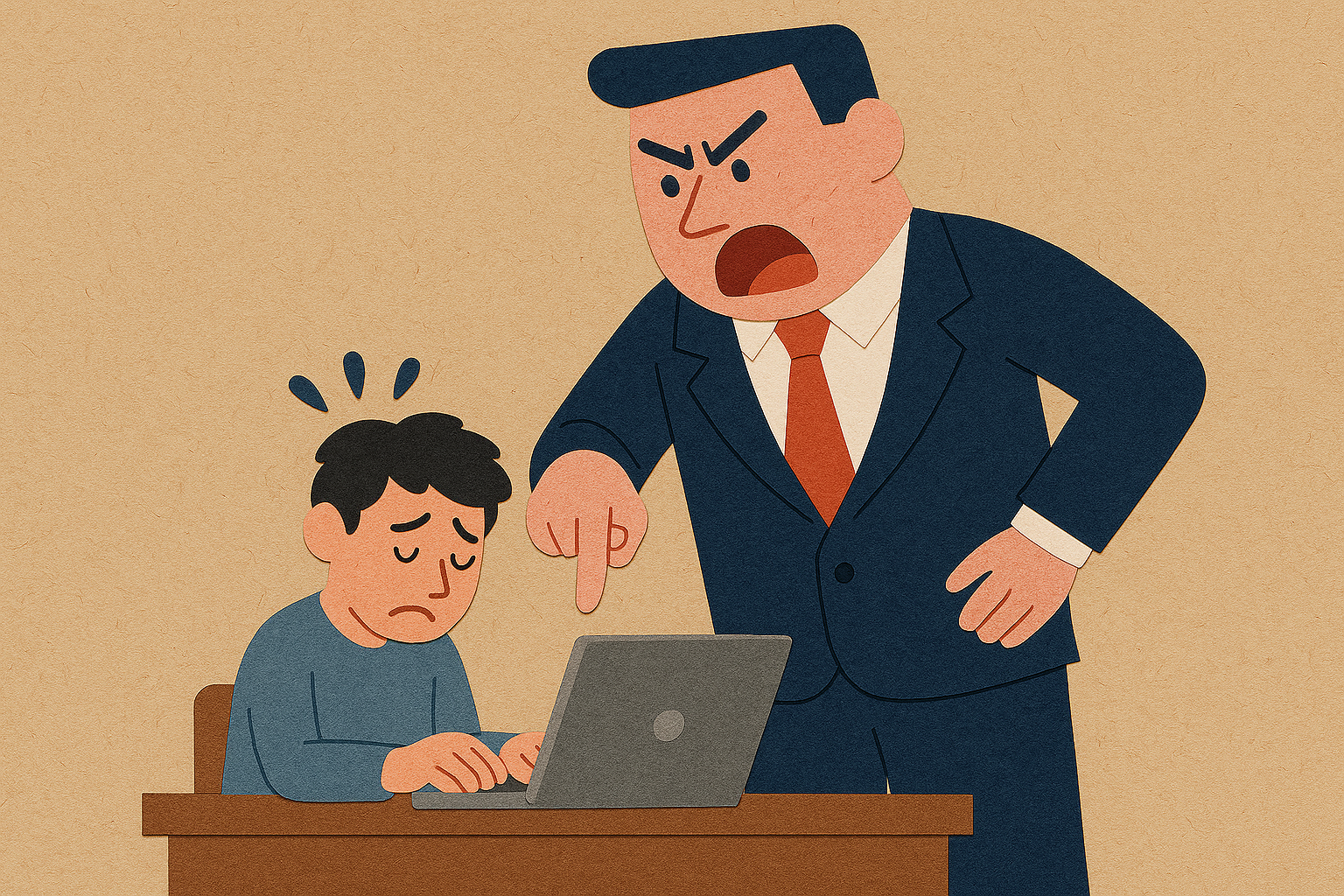Let me tell you something that might surprise you: The hardest part of working under an overbearing boss isn’t always the micromanagement, the unrealistic deadlines, or even the passive-aggressive Slack messages at 9 p.m. on a Sunday. It’s what those things do to you—slowly, over time, until you barely recognize yourself.
I know, because I’ve been there.
This article isn’t just a list of symptoms. It’s a rallying cry. If you’ve ever walked on eggshells at work, rewritten an email five times before hitting send, or felt your stomach flip when your boss’s name popped up in your inbox… you’re not alone. And you’re not imagining it.
Let’s walk through what it really feels like to work for someone who smothers, controls, and critiques—and what you can do to protect your sanity and confidence.
👉 Related read: 7 Signs Your Boss May Be Micromanaging You
1. An Overbearing Boss Makes You Doubt Your Every Move
Working for an overbearing boss turns even the most competent employee into a second-guesser. You don’t just check your work—you triple-check it, rehearse every conversation in your head, and still brace for criticism. It’s exhausting.
I once had a manager who insisted on being cc’d on every single email I sent. Not just the important ones. Even things like confirming a lunch order. Eventually, I found myself hesitating before hitting “Send” on anything, wondering, “What would they say about this sentence?” I was editing out my own voice in real time.
That’s what overbearing bosses do—they don’t just control your output. They hijack your inner voice.
2. You Feel Like a Puppet, Not a Professional
A healthy boss trusts. A controlling boss monitors. Instead of being treated like the capable adult you are, you’re reduced to a pair of hands—just there to execute someone else’s overly specific vision. There’s no room to think, suggest, or lead. Just follow.
At first, it might feel like they’re just being thorough. But then it turns into constant oversight, red pen edits on every document, and daily “check-ins” that are really just disguised interrogations.
It’s the professional equivalent of being followed around a store by someone who thinks you’re going to shoplift.
3. Your Wins Get Dismissed or Claimed
Ever landed a big project, only to have your boss reframe it as their idea? Or worse, nitpick one tiny detail and skip over the entire success? Yeah.
Overbearing bosses often struggle to share credit. They want control, and with that comes the need to be the star. Your efforts? They become invisible. Or absorbed into the glow of your boss’s ego.
I remember putting together a campaign that overperformed by nearly 200%. My manager’s only comment? “Next time, run the copy by me first.” I should’ve been proud. Instead, I felt… defeated.
When your work is constantly overshadowed, it’s hard to keep showing up with the same passion.
4. Emotional Exhaustion Becomes the Norm
It’s not just the tasks—it’s the tension. The constant feeling of being watched, corrected, or dismissed wears on your nervous system. You start to dread meetings. You flinch when you get feedback, even if it’s positive. Your stress spills over into your evenings, your weekends, your sleep.
It’s like emotional sandpaper. Tiny irritations every day that eventually wear you down to the bone.
Signs you might be emotionally exhausted at work:
- You replay conversations in your head long after they’re over
- You panic when your boss messages you, even if it’s just “Got a sec?”
- You feel numb when you used to feel passionate
And here’s the kicker: You blame yourself. You think, “Maybe I’m just sensitive. Maybe I’m not cut out for this.” But let’s be clear—you’re not the problem.
5. You Start Hiding Instead of Shining
You used to speak up in meetings. Now, you just nod along. Taking initiative used to feel natural. These days, you wait for instructions. Somewhere along the way, you learned the cost of taking risks is just too high when someone is always waiting to tell you what you did wrong.
This is the slow erosion of self-confidence.
People don’t go quiet because they have nothing to say. They go quiet because they’ve learned it’s not safe to speak.
6. Your Self-Worth Gets Tied to Their Approval
Here’s where it gets really tricky.
Overbearing bosses often create a power dynamic where your sense of success becomes tethered to them. You start chasing their praise like it’s oxygen. A “good job” feels like a lifeline. A “we need to talk” feels like a death sentence.
And even when you know they’re being unfair, you still want their validation. That’s not weakness. That’s human.
But it’s also dangerous—because you start making career decisions based on fear, not ambition. You stay too long. You stop growing. You start believing that you’ll never find a better environment.
Spoiler: You will.
7. Your Overbearing Boss Makes You Fantasize About Quitting
It usually starts subtly—daydreaming about a new job, scanning LinkedIn after a tough meeting, venting to a friend over wine. But it builds. The more suffocated you feel, the more desperate you are for air.
And yet… leaving feels terrifying.
That’s one of the cruelties of working under someone controlling. They often make you feel like you’re lucky to be there—that you wouldn’t be as successful without them. They may even say things like, “Not everyone would be so patient with your learning curve” or “You’d get eaten alive at [insert dream company here].”
That’s not mentorship. That’s manipulation.
How to Cope with an Overbearing Boss
So what do you do when your boss is suffocating your spirit?
Here are a few steps that helped me—and might help you too.
Document everything
If your boss’s behavior crosses the line into toxicity, keep a log. Save emails, note patterns. This can be useful for HR… or even just for validating your own reality.
Set micro-boundaries
Even if you can’t change the big picture right away, you can protect your time and energy. Don’t respond to late-night texts unless absolutely necessary. Use calendar blocks to preserve focus time.
Find allies
Talk to coworkers you trust. You’ll often find you’re not the only one feeling the pressure. Solidarity helps.
Talk to a therapist or coach
Seriously. This stuff gets under your skin. A professional can help you untangle what’s happening and rebuild your confidence.
Make an exit plan
You don’t have to storm out tomorrow. But start laying the groundwork for your next move. Update your resume. Reconnect with your network. Remind yourself that other workplaces do exist—and many are far healthier.
One Final Note: It’s Not You
Let me say that again for the people in the back: It’s. Not. You.
Working for an overbearing boss doesn’t mean you’re bad at your job. It doesn’t mean you’re weak, or thin-skinned, or hard to manage. It means you were in a dysfunctional dynamic that made it hard to thrive.
You deserve better.
You deserve a workplace that values your ideas, trusts your instincts, and lets you breathe.
And if you’ve forgotten what that feels like, let this article be your reminder.
You’re still in there. The confident, capable, creative person. The one who wants to work hard—but doesn’t want to be crushed in the process.
Reclaim your voice. Reclaim your worth. You’re not here to be micromanaged into mediocrity.
You’re here to shine.


One thought on “What It’s Like to Work for an Overbearing Boss”
Comments are closed.